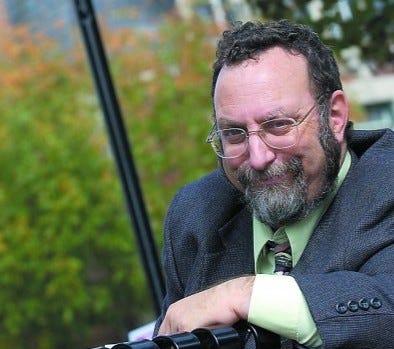
I was still a little lit, so I decided to stay off the expressway, and use surface streets instead.
Ogden Avenue was wide and concrete and deserted at 3 a.m. It was a pleasure to drive my overpowered Buick wagon at the limit, soundlessly putting the miles and the cigarette butts behind me on Route 66.
I was young and out of work and on top of the world.
And then I saw the lights go on in the rearview mirror.
“Your life,” I told myself, “is about to change markedly for the worse.”
The police officer walked leisurely up to my open window and said, “That is a pretty ignorant way to pull over.”
Not a good start, I thought.
I told him that I was not used to being stopped, and I pulled over at the closest place to where I was, which happened to be the median in the middle of Ogden Avenue/Route 66, just south of 26th Street.
He gave me a look that said, wordlessly but unmistakably, “You are an idiot. But I am used to that.”
He then asked why I had no license plate on the front of the car. I showed him the plate, propped up on the dash, which I had been too lazy to screw on in the three weeks I had owned the big Buick. I was relieved that he seemed interested in my vehicle, instead of how it was being driven.
Not for long.
“Would you please step out of the car, Mr. Leavitt?”
When I could get a good look at him, I could see he was a big man, slightly overweight, a dark-haired white fellow of about 40, and six foot five.
He checked me for weapons. Then he asked me where I’d been coming from, so late at night. He asked me about my neighborhood. And my parents. And the kind of work I did, when I had any.
This is the most friendly drunk driving arrest imaginable, I thought.
So I took a chance, and asked him where he lived, and what he used to do before he got into law enforcement.
And he answered, and one thing led to another, and we chatted for a half hour in the middle of Ogden Avenue at 26th Street.
We talked about all kinds of interesting things, none of which I remember. But I can tell you this: we never dwelled on the ill-considered thing I was doing when he pulled me over.
Finally, he said, “You should go home. Be careful.”
I didn’t really want to go, because I was enjoying the conversation.
“I have to go fight crime now,” he said.
I got back in the Buick and headed north, and pondered why a veteran patrol officer of the Chicago Police Department had engaged me in conversation.
Then it dawned: he was stalling until he was sure that I was sober enough to drive without endangering myself or others.
The reason is steeped in what cops refer to as “police discretion.” They could never arrest everybody that commits a crime, and some arrests serve no good purpose, and can even be counterproductive when it comes to keeping the peace. So they’re given some leeway.
I would almost certainly have passed a Breathalyser test that night. But I still could easily have been charged with driving impaired. Before I was stopped, I had unnecessarily swung the Buick through two lanes to avoid a pothole, which turned out to be just a shadow. Plenty for a cop and assistant state’s attorney who might be sticklers.
Some people may think a cop charging a driver like Rayshard Brooks, who drank too much and fell asleep in an Atlanta fast-food drive-through, is necessarily being a stickler.
That may be a tough call, if you’re considering applying discretion. Not so much if you’re by-the-book, however. If the keys are in the ignition, it’s no different than if you passed out at a stoplight, in most jurisdictions. You qualify for a free room in The Greybar Hotel.
But falling asleep in a drive-through is not really the same as sleeping at a red light. It does not necessarily indicate the height of irresponsibility, though it annoys everybody else in line.
Consider those other people in line for hamburgers in the wee hours of the morning. A cop could probably just walk down the queue and arrest almost every one of them. Fish in a barrel.
But that almost never happens. I’ve never heard anyone say that it should. Apparently, we don’t want all the drunk drivers arrested. Alcohol is legal, and it’s big business. So is after-hours fast food, for that matter.
The police officer who decided to give me a break on Ogden Avenue that night had very little in common with me. We lived miles apart, were very different in age, marital status, education, religion and even size. We ate differently and followed different sports.
We had only a little in common. We were both charming devils, and we were both white.
Was skin color a factor in my good fortune that night, which allowed me to more easily get work a few days later, a job I’d hold for more than 10 years? Of course it was.
I’m grateful I got that pass on Route 66 that night. It’s possible that my future was in the balance.
Everybody needs a break once in a while. You shouldn’t have to look a certain way to get one.



"Sliding Doors" Irv. You never know.
❤️